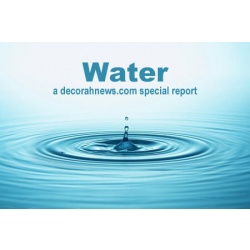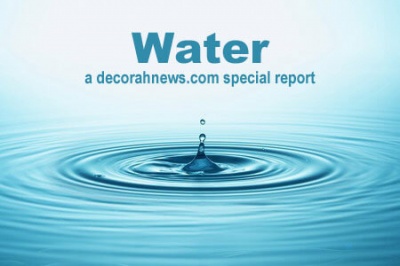
"Water," a decorahnews.com special series: Watershed authorities are one way to work on water quality
In 2015, the Des Moines Water Works filed a lawsuit against three Iowa counties--Buena Vista, Calhoun and Sac--contending that the agricultural practices of the counties pollute the Raccoon River, which provides drinking water for a half a million Iowans.
Des Moines' water authority says that the counties must pick up a much higher cost for the treatment of that water, contending that the counties have knowingly allowed nitrates from 10 drainage districts to pollute the river. The counties are arguing that their is no proof that agriculture is directly responsible for the increased nitrate levels.
In the middle of July of this year, the Iowa Soybean Association contributed $150,000 in support of these counties, just months after the ISA contributed $65,000 to these counties this spring.
In response to this lawsuit, many Northeast Iowa communities are working to establish watersheds for rivers and streams in the area, to ensure that this issue does not happen in this part of the state.
Northeast Iowa Resource Conservation & Development Watershed Planner Ross Evelsizer said that agricultural drainage is especially important for this area of Iowa.
"The biggest concern in this area of the state, being the Driftless Area, is that our groundwater is tied closely to our surface water," Evelsizer said. "In Northeast Iowa, its a matter of days, or even hours, for water to reach an underground aquifer, whereas in Western Iowa it could take weeks."
According to the NEIRC&D, the best way to deal with these issues of agricultural runoff is to establish strategies to capture runoff before it goes in.
Winneshiek County Supervisor John Beard said that the Turkey River watershed has worked toward this goal with their research in "buffer stripping" of agricultural fields, which keeps strips of land that are left to natural growth.
"There are several benefits we can see with stripping," Beard said. "Strategically replacing 10 percent of grow fields with buffer strips has proved to reduce topsoil loss by at least 90 percent. Not to mention that it also brings in native wildlife, which helps control pests that farmers are concerned with in growing season."
Although poor agricultural practices are a big influence on water quality in Iowa, Beard says it is important to remember that there are other contributing factors.
"Fertilizers and pesticides used in cities are also a contributor to the water quality issue," Beard said. "A lot of people don't think that spraying fertilizer in their backyard will do much, but it does something."
The City of Decorah has seemingly recognized the issue of city runoff as another component to this issue and has proposed a new storm water utility to help reduce Decorah's water drainage.
Site designed and maintained by Iroc Web Design Services©.
Your Small Business Web Design Solutions.™


